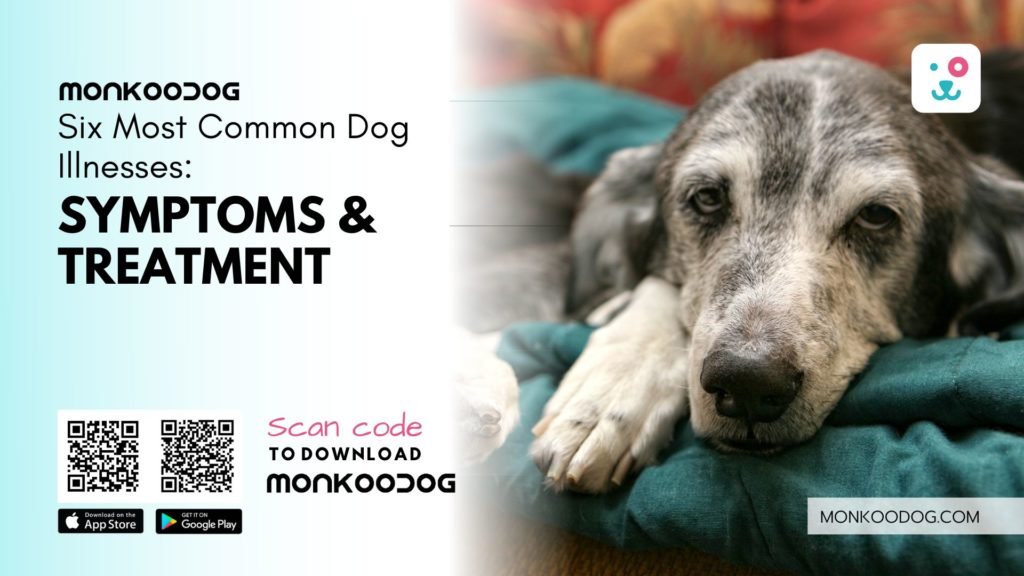Introduction
Pets, especially dogs, are human’s best companions for life. Being pet parents, we always wish for the health and well-being of our beloved pets and also want their long life. Their playfulness, activeness, and happiness depend on how fit they are.
Dogs are vulnerable to health issues very fast. They are prone to many common illnesses such as kennel cough, ear infections, ringworms, etc. Dogs of all ages can get affected by various health conditions, hence it is better to know about these health issues, how to diagnose them, and tips on how to treat these illnesses.
We all love our pets, from little chihuahua to giant great dane and various other breeds. But when our beloved puppies fall ill, it not only disturbs them but also disturbs us. “Healthy Dogs Are Happy Dogs.”
Dive into this article to learn everything about common illnesses, their symptoms, and treatments.
Also See:-Dog Nail Trimming: 7 Tips For An Easy Trim
Common Illnesses In Dogs

It is obvious that your dog can suffer from some health issues at any point in age and have to be taken complete care of. Some of these illnesses may not be quite serious but other diseases can be life-threatening. Knowing about these illnesses is very important as it not only helps you to protect your dog from these health issues but also can treat your dog if he gets affected by these health problems.
Let us have a look at these common health issues thoroughly:
1. Kennel Cough:-
Symptoms of kennel cough typically include a persistent, dry, hacking cough, sometimes accompanied by retching or gagging. While it’s usually not life-threatening in healthy adult dogs, severe cases or those involving puppies, elderly dogs, or dogs with weakened immune systems can lead to complications like pneumonia, which can be more serious.
Prevention is key in managing kennel cough. Vaccination can help reduce the risk of infection, especially in high-risk environments. Additionally, minimizing exposure to other dogs with respiratory symptoms and maintaining good hygiene practices, such as regular cleaning of food and water bowls and avoiding shared toys, can help prevent the spread of the disease.
If your dog displays symptoms of kennel cough, it’s essential to consult with a veterinarian for proper diagnosis and treatment. They may prescribe medications to alleviate symptoms and, in severe cases, may recommend supportive care such as rest and hydration to aid in recovery.
Symptoms:
- Persistent hacking cough or cough with thick mucus
- Reduced appetiteFever
- Dry coughing
- Nasal discharge
Treatment:
- Vets will suggest your dog to give a steam or humidifier treatment if he admits difficulty in breathing
- They may also prescribe antibacterial medicines or antibiotics for your dog
- Giving sufficient amount of liquids will keep him hydrated
- A proper diet as prescribed by your vet will be given to your pooch and them so that they don’t eat any harmful stuff.
- Keep him in a warm environment, restrict the exercise, and avoid contact with other animals.
2. Ear Infections:-

Ear infections in dogs can indeed be a significant concern, often caused by various factors such as ear mites, excessive wax production, or underlying skin issues. While they typically affect the outer ear canal initially, if left untreated, they can progress to the middle or inner ear, leading to more severe complications.
Preventive measures like regular ear cleaning and inspection can help mitigate the risk of ear infections. Additionally, addressing any underlying conditions contributing to the infection, such as allergies or hormonal imbalances, can also be crucial in preventing recurrences.
If you suspect your dog has an ear infection, it’s essential to seek veterinary care promptly. Your vet can properly diagnose the infection and recommend an appropriate treatment plan, which may include medications like antibiotics or antifungals, ear cleaners, and in some cases, dietary changes or allergy management. Early intervention can help prevent the infection from worsening and causing further discomfort to your furry friend.
Symptoms:
- Excessive or persistent scratching
- Swelling or redness in the ear canal
- Pain, odor, itchiness
- Head shaking
- Loss of balance
- Head tilt
Treatment:
- Your vet may suggest ear drops, anti-inflammatory pain relief, antibiotics, or any other treatments for underlying issues.
- Always maintain the hygiene of your dog’s ear and don’t allow the ear-wax to build in. Use a medicated ear solution prescribed by your vets to clear your buddy’s ear from wax buildup.
- Don’t use cotton earbuds.
3. Parvovirus:-
This is another common but deadly illness that affects dogs. This usually affects puppies and harms their lungs. It is caused by the attack of a virus and affects the intestinal tract and also the white blood cells. This fatal disease is highly contagious.
Symptoms :
- Excessive vomiting
- Diarrhea with blood
- Lethargy/laziness
- Loss of appetite
- Dehydration
Treatment:
- Although it is hard to kill the virus, you can minimize its impact by several preventive measures.
- Dogs infected with these viruses need intensive care and treatment has to be given in veterinary hospitals only.
- Your dog has to be hydrated and has to be given a sufficient amount of fluids.
- He has to get a proper vaccination that helps him to build immunization to fight against the virus and to lower the symptoms.
- Although the treatment for parvovirus is not often successful, you can save the life of your pooch by proper vaccination.
4. Rabies:-
Rabies is a deadly disease that can affect almost all mammals including bats, dogs, and humans. It affects the brain central nervous system and also spinal cord. Your dog can catch this fatal disease when he gets bitten by infected animals.
Symptoms:
- Extreme aggression
- Frequent biting
- Loss of appetite
- Attacking others more frequently
- Eating disorders
- Seizures
- High temperature or fever
- Weakness
- Trying to hide in the dark
- Hypersensitivity
- Foaming in the mouth
- Paralysis
Treatment:
- The treatment for Rabies is still unknown after it is contracted. Rather it would be prevented by maintaining the proper vaccination schedule.
- If your dog comes in contact with another rabid animal, immediately reach out to your veterinary doctor for further support.
5. Cancer:-
Cancer is the deadliest and scariest disease. We all know the impacts of this deadly disease. Our furry friends also get affected by Cancer of various types. By having a proper understanding of the disease, we can treat our furry babies properly and can save their lives. Having said that, the treatment has to be started immediately as soon as we observe the symptoms of cancer in our dogs.
Symptoms:
- Lumps
- Soreness
- Swellings
- Loss of appetite
- Difficulty in urinating or defecating
- Difficulty in breathing
- Weight loss
- Black stool
- Bad breath
- Extreme lethargy
Treatment:
- The treatment of Cancer will depend on its type and stage.
- Chemotherapy, radiography, and surgery are the common treatments for Cancer in dogs.
- It can be cured completely if treated in the earlier stages.
- Some dog owners don’t want to go for any treatment for their cancer-affected dogs. Instead, they prefer to go for case palliative end-of-life care with pain relief. The decision may depend on the sensitivity of the cancer stage and the health of their dog.
6. Ringworms:-
Ringworm in dogs is indeed a concerning issue. Not only can it cause discomfort and pain for your furry friend, but it’s also transmissible to humans, making it a double threat. Early detection and treatment are crucial to prevent its spread and alleviate your pet’s discomfort. Veterinary care is essential to effectively manage and treat ringworm infections in dogs, ensuring the well-being of both your pet and your family members.
Also, See:10 Signs Through Which Your Dog Communicates To You
Symptoms:
- Mild ringworm won’t show any significant symptoms but you need to take your dog for routine health checkups to ensure that he is completely alright.
- Skin ulcers on the paws, forelimbs, ears, and head of your dog
- Circular bald spot with red center
- Excessive hair fall
Treatment:
- Use a specialized shampoo or powder prescribed by your veterinary doctor.
- Oral medicines, especially antifungal pills can be given to your dog.
- To be noted, this health issue can occur more than once. It cannot be curable completely but can be prevented. So, with proper care and preventive measures you can avoid the spread of this disease.
Conclusion:
With proper precaution and care, you can ensure a happy and healthy lifestyle for your furry friend. Although we always need to be focused on the positive things in life, it is crucial to be prepared for the worst situations. Prevention is better than cure and hence, by taking preventive measures, you can protect your doggy from possible illnesses.
Share your views and feedback.

